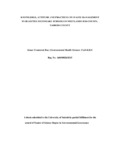Knowledge, attitude and practices on waste management in selected secondary schools in Westlands Sub-County, Nairobi County
Abstract
The population of Nairobi has continued to increase from initial 8,000 people in 1901
to around 3.8 million people by 2015. The increased population has triggered a rise in
student enrolnment which has subsequently led to constrained resources used for waste
management in the schools. The overall objective of this study was to assess
knowledge, attitude, and waste practices on waste management in selected secondary
school students in Westland Sub-county, Nairobi, Kenya. Descriptive study design
was deployed to study and analyze a study population comprising of six public and
six private school‟s students in the Westlands Sub-county. Stratified cluster sampling
method of sampling was used where (n) =3887 students in 12 secondary were
interviewed. Data was collected using structured questionnaires. Descriptive statistics
was used in data analysis. From the findings, 61.4% of the respondents came from
public schools while 38.6% of the respondents came from private schools and 17 of
the respondents were enrolled in public schools while 27 respondents were enrolled in
private schools from their former schools. Results indicated most waste in the schools
was in the form of food left overs which was followed by pen, flower trimmings,
pieces of clothes and fruit & vegetable peels, mostly produced plastics as inorganic
waste, empty bottles used for drinks, bags and bookcases and filing cabinets. Attitude,
knowledge, and practices were found to be key determinants of waste management in
secondary schools in Westland Sub-county. The study concludes that the secondary
schools in Westland Sub-county produces different types/ kinds of waste and as such
there were waste practices associated with how waste was managed in the respective
schools. Waste practices in existing secondary schools in Westlands Sub-county and
such practices were an important determinant of waste was dealt with in schools. The
researcher recommends that the school should come up with environmental topics in
the curriculum, educate the public on the effects of environmental pollution, putting
proper signage among others.
Publisher
University of Nairobi
Description
Master of Science Degree in Environmental Governance
Rights
Attribution-NonCommercial-NoDerivs 3.0 United StatesUsage Rights
http://creativecommons.org/licenses/by-nc-nd/3.0/us/Collections
The following license files are associated with this item:


